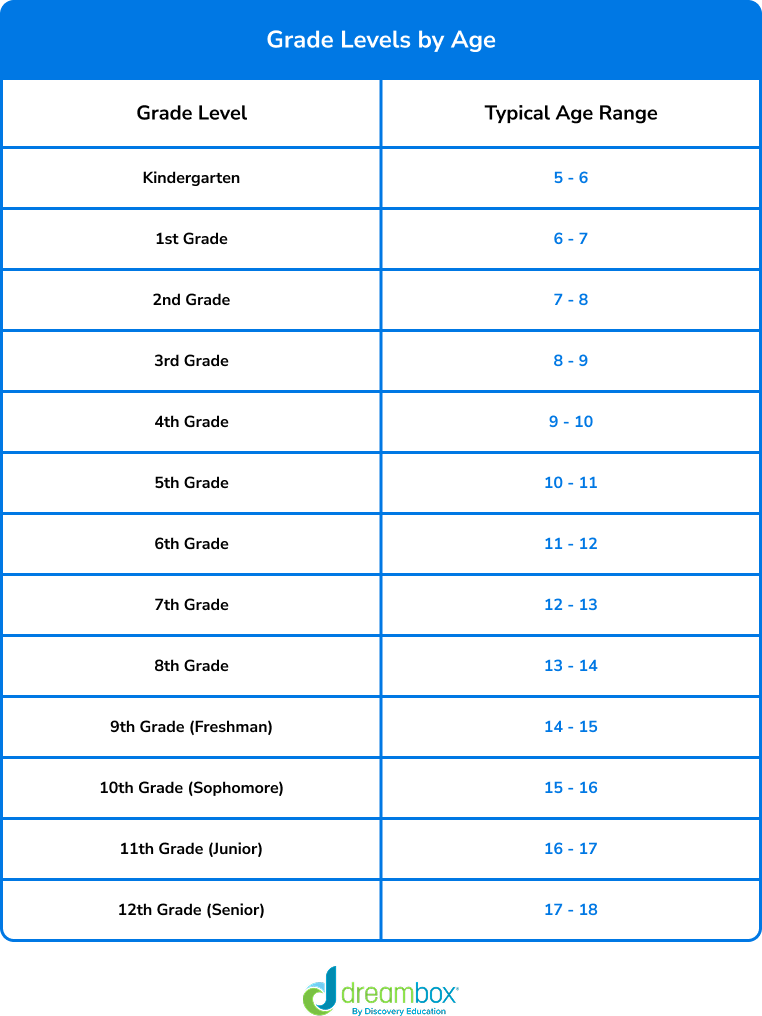How Old Are Kids in Each Grade? Age vs. Grade Guide
Find out what grade your child should be in at each age with our simple Pre K through 12th grade guide.
Published:
October 2025
Key takeaways
- • Excluding exceptions, most kids in the same grade are usually about a year apart in age
- • Knowing the common age for each grade can help parents plan for academics, social growth, and school transitions.
- • If you’re unsure about your child’s grade placement, their school can offer guidance and support.

Moving your kid to a new school or grade? You’re probably wondering which grade matches their age. It’s not always clear-cut, especially if you’re unfamiliar with how U.S. schools work.
Generally, kids in the same grade are within a year of each other in age. Of course, some children skip grades, repeat a year, or start school later – so there are exceptions.
We’ve created a simple age-to-grade reference from Pre-K through 12th grade to help you figure out where your child should be.
Quick Age vs. Grade Reference
| Grade | Typical Age |
|---|---|
| Pre-K | 4–5 years old |
| Kindergarten | 5–6 years old |
| 1st Grade | 6–7 years old |
| 2nd Grade | 7–8 years old |
| 3rd Grade | 8–9 years old |
| 4th Grade | 9–10 years old |
| 5th Grade | 10–11 years old |
| 6th Grade | 11–12 years old |
| 7th Grade | 12–13 years old |
| 8th Grade | 13–14 years old |
| 9th Grade (Freshman) | 14–15 years old |
| 10th Grade (Sophomore) | 15–16 years old |
| 11th Grade (Junior) | 16–17 years old |
| 12th Grade (Senior) | 17–18 years old |
Typical Elementary School Ages: (Pre K - 5)
Elementary school is all about laying the foundation for future learning. Children learn reading, writing, and math, along with social skills, independence, and early problem-solving.
Typical Middle School Ages: Grades 6–8
Typical High School Ages: Grades 9–12
High school combines academics, extracurriculars, and planning for life after graduation.
- 9th Grade (Freshman): 14–15 years old
- 10th Grade (Sophomore): 15–16 years old
- 11th Grade (Junior): 16–17 years old
- 12th Grade (Senior): 17–18 years old
Exceptions and Cutoffs for Typical Ages for Each Grade Level
Not every child’s age and grade perfectly into this chart. Here are common exceptions:
- Birthday Cutoffs: Schools typically have enrollment deadlines between August and October for kindergarten, which can impact their age for the subsequent grades as they progress through school.
- Skipping a grade: Some students skip a grade if they’re not challenged enough academically, making them younger than their classmates.
- Repeating a grade: Some students repeat a grade to build stronger skills, putting them a year older than their classmates.
Every child learns at their own pace and there is no single right grade for everyone. If you’re wondering what grade your nine year old should be in or want to make sure they are in the right place for their learning, contact their school. Teachers and counselors can give guidance to help your child succeed.
Table of contents
Access more math practice with DreamBox
Take at home math practice to the next level
Empowering parents and educators to make math practice more impactful. Plus, your kids will love it.
